The study, published in the Science Translational Medicine journal, describes their approach that involves inactivating a gene called kat7 which the scientists found to be a key contributor to cellular aging.
The specific therapy they used and the results were a world first, said co-supervisor of the project Professor Qu Jing, 40, a specialist in aging and regenerative medicine from the Institute of Zoology at the Chinese Academy of Sciences (CAS).
Genome-wide CRISPR/Cas9 based screening in human premature aging stems calls was conducted to identify over 100 candidate senescence promoting genes out of 10,000 potential genes, and the scientists further verified the effectiveness of inactivating each of the top 50 candidate genes in promoting cellular rejuvenation using targeted sgRNAs.
“These mice show after 6-8 months overall improved appearance and grip strength and most importantly they have an extended lifespan for about 25%,” Qu said.
They identified 100 genes out of around 10,000, and kat7 was the most efficient at contributing to senescence in cells, Qu said. KAT7 encoding a histone acetyltransferase was identified as one of the top targets in alleviating cellular senescence, increasing in humans mesenchymal precursor cells during physiological and pathological aging. Depletion of KAT7 attenuated cellular senescence while overexpression accelerates cellular senescence.
Kat7 is one of tens of thousands of genes found in the cells of mammals. The researchers inactivated it in the livers of the mice using a method called a lentiviral vector. Mechanistically, inactivation of KAT7 decreased histone H3 lysine 14 acetylation, repressed p15INK4b transcription, and rejuvenated senescent human stem cells.
“We just tested the function of the gene in different kinds of cell types, in the human stem cell, the mesenchymal progenitor cells, in the human liver cell and the mouse liver cell and for all of these cells we didn’t see any detectable cellular toxicity. And for the mice, we also didn’t see any side effect yet.”
Despite this, the method is a long way from being ready for human trials, Qu said. “It’s still definitely necessary to test the function of kat7 in other cell types of humans and other organs of mice and in the other pre-clinical animals before we use the strategy for human aging or other health conditions,” she said.
Qu said she hopes to be able to test the method on primates next, but it would require a lot of funding and much more research first. This study strengthens our understanding of aging mechanisms and provides new potential targets for aging interventions.
“In the end, we hope that we can find a way to delay aging even by a very minor percentage…in the future.”




